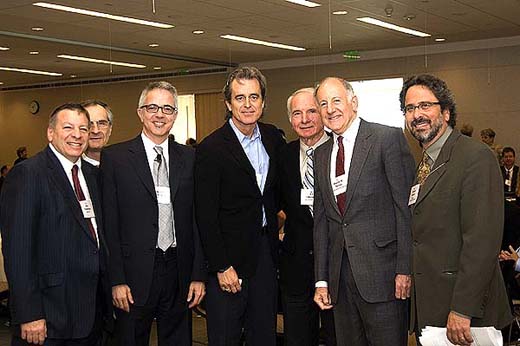|
By Jorge Casuso
March 30 -- The mayor and judges, the court administrators
and social service providers, and the City and State officials
who attended the conference Thursday on addressing homelessness
through community courts all wanted to talk about one thing
-- Red Hook.
Pull aside one of the 150 experts and stakeholders who attended
the all-day conference at the RAND Corporation, and they were
invariably struck by the dramatic success of the one-judge
court in a “lawless” drug-ravaged port village
in Brooklyn.
“Did you catch the part about Red Hook?” Council
member Bobby Shriver said during a break.
“You saw what they did in Red Hook,” another
top ranking City official noted during an interview.
 |
| From left: Judge Alex
Calabresi, presiding judge of the Red Hook Community Justice
Center; David Meyer, acting justice, Supreme Court of
New York (partially obscured); Julius Lang, Center for
Court Innovation, New York City; Santa Monica Council
member Bobby Shriver; Ed Edelman, special representative
for Homeless Issues; the Honorable Ronald M. George, Chief
Justice, California Supreme Court, and Mayor Richard Bloom
(Photo by Diane Baldwin) |
Launched seven years ago after the murder of a public school
principal, the Red
Hook Community Justice Center has lowered crime, boosted
confidence in the justice system, brought the community together
and, most importantly, saved lives, said Judge Alex Calabrese,
the court’s only judge.
“It combines services with the power of the court,”
Calabrese said. “A regular court gives (defendants)
two choices -- in jail, out of jail. I have a whole palette
of options.
“The community court gives the judge authority and
social service tools for a holistic approach,” he said.
“You’re putting the services up front, and you’re
making a whole new life for the kid and for society.”
Thursday’s conference -- which featured presentations
by experts, judges and lawmakers from across the country --
gave City officials a yardstick by which to measure the progress
and tweak features of the Homeless Court Santa Monica launched
in February. (see
story)
“What we have is a pilot court,” said Kate Vernez,
assistant to the City Manager for community and government
relations. “We’re hearing ideas about how to grow
our court.”
The Santa Monica Court “is a work in progress,”
said Mayor Richard Bloom, who was a member of the panel that
crafted Bring LA Home, a ten-year, countywide plan to end
homelessness. “It’s a pilot project and there’s
an ongoing evaluation.”
“There’s certainly models across the country
that work,” said Julie Rusk, who heads Santa Monica’s
homeless programs. “It’s an inspiring overview.
“When you look at what it takes to address some of
these intractable issues, there’s no doubt you need
tons of people that cross disciplines,” Rusk said. “Often
these systems are fragmented. This is about creating collaboration.”
Bankrolled with an initial $500,000 from the County, the
local court -- which gives the homeless charged with minor
crimes a chance to hook up with social services instead of
going to jail -- the Santa Monica Homeless Community Court
is widely viewed as a model for the region.
Santa Monica officials hope the conference -- and especially
the dramatic testimony from Red Hook -- will spur other cities
across LA County to join the growing number of cities developing
community courts -- from South Africa to New Zealand and Dublin
to Singapore.
“The objective of this conference is to broaden the
number of people who know about it,” Bloom said. “We
only have one little program in Santa Monica, and we’re
a big county.
“Obviously, this has to take hold if it’s going
to affect the number of lives we have to affect,” he
said.
Bloom noted that the conference -- co-sponsored by the City,
RAND, the California Endowment and Public Counsel -- was attended
by half a dozen LA County judges, as well as County Court
administrators.
Council member Bobby Shriver, a driving force behind the
City’s homeless initiatives, called on State and County
officials to join in the effort.
“It’s all about the political will," Shriver
said. “We need the Governor, the Mayor (of LA) and the
County Supervisors to sign on. This conference is going to
build support for the community courts.”
Rusk agreed.
“It requires political leadership,” Rusk said.
“That’s what we need. Our message is we’re
doing our part, and others need to step up to the plate.
“Hopefully, this will get others inspired and see the
possibility,” she said. |